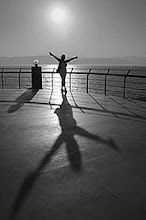I was asked for book recommendations a few weeks ago and felt utterly overcome with responsibility. What if you didn't like the books I recommended? Or, like always happens every time I recommend a TV show, I've forgotten something in them that will make you very uncomfortable? Or I leave a book out that deserves its place on my shelf of favorites? And what if I make my favorites sound worse than they are by trying to be honest about them? And what if I'm no good at reviews?
I have overcome these fears by not thinking about them. Which seems to be my new approach to fears and things I don't like in general. What's that you say? Avoidance? So?
Thus, in no particular order, here are my favorite books.
Peace Like a River:
Told from the perspective of a little boy, Rueben, I love nearly all the characters in this book, particularly Rueben's sister Swede. But I think what makes it one of my favorites is that it's a book about miracles--about the mercy and attentiveness of God--that doesn't get cutesy or preachy. Instead, it's a story in which miracles occur and largely go unnoticed, or freak people out. The downside of this book is that, like so many others, the ending feels rushed.
How to Kill a Mockingbird:
You all should have read this in high school. If you were deprived of that opportunity, go pick it up from the library. If you used sparknotes or intuition to get by on the tests, go pick it up from the library. And if you read and thought, "That was nice," but it didn't make you laugh or cry hard, go pick it up from the library. That's all.
The Elegance of a Hedgehog:
I adore this book. I love this book. I recognize that this book is not for everyone. It's plot is slow to start, and slow to pick up. It's a book that is largely concerned with people and ideas and, so, will dwell on them for quite a long time. Also, there is this side plot concerning suicide which can be thematically disturbing. And while we're being completely honest about things I don't adore about this book, I have to say that I thought the ending was the product of either a lazy writer or a lazy editor.
Those things honestly sound worse than they are. What I love about The Elegance of a Hedgehog is it's main character who intelligent, funny, and utterly unorthodox in the world of fictitious heroines. I also think the language is soul-stirringly immaculate. Truly, this book is worth reading if only for the vocabulary boost. I think we often read, or participate in any kind of art really, because we want to feel a certain way. When I'm stressed out I listen to cello music, and read this book (and, yes, eat lots of chocolate) and I feel better.
Howls Moving Castle:
This book is nowhere near the quality of the other books I'm recommending. There is nothing in this book that I feel the world at large should become aware of. The language is entirely adequate, the characters funny, interesting, but probably not deep. I'm recommending this book not because I think it is a triumph of modern literature, but because I like it and because I think you can't always be reading triumphs of modern literature.
Howls Moving Castle is a fantasy book about a girl who gets cursed--and turns into an old woman. Which, yeah, pretty much stinks. But instead of buying a new wardrobe of lavender and lace and feeling sorry for herself--which is probably what I would do--she runs away from home and becomes a cleaning lady or an evil wizard. And this is why I will never be a heroine.
The Book Thief:
This is one of those books that I'm pretty sure everyone has heard about. In fact, I think all of these books might be this way. Or maybe I just love them so much it's difficult for me to imagine it's not. The Book Thief is a product of genius story telling, gorgeous language, and brilliant character development. It's narrated by Death and takes place in Nazi Germany. And it is one of two books I have ever read and thought, "That was the perfect ending."
Go read it. Now.
Perspective: Three Years
7 years ago




